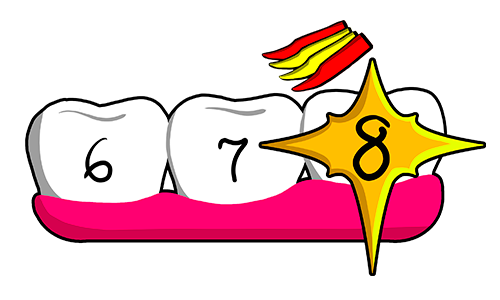The main organization overlooking dentistry in China stated that impacted wisdom teeth should be removed preventively. I disagree.
Recently, the Chinese Stomatological Association (CSA) published a statement recommending the preventive removal of impacted wisdom teeth, even when they are asymptomatic and show no signs of pathology. This recommendation has been widely circulated and could potentially influence dental practice both in China and internationally.
As a dentist committed to evidence-based practice and minimally invasive dentistry, I must express my strong disagreement with this recommendation. The preventive removal of asymptomatic impacted wisdom teeth goes against the best available scientific evidence and multiple international clinical guidelines.
The CSA's Position
According to the statement, the CSA recommends the removal of impacted wisdom teeth to prevent future complications such as pericoronitis (inflammation around the crown of a partially erupted tooth), damage to adjacent teeth, cyst formation, and crowding of anterior teeth.
While these are common justifications for wisdom tooth removal, they are based on outdated beliefs rather than solid scientific evidence. Let's examine each of these claims:
Pericoronitis Risk
While pericoronitis can occur around partially erupted wisdom teeth, it is not an inevitable outcome. Many people with partially erupted wisdom teeth never experience this condition. When it does occur, it can often be managed with conservative measures such as improved oral hygiene, irrigation, or minor surgical procedures that preserve the tooth.
Removing all impacted wisdom teeth to prevent pericoronitis in a small percentage of cases is like removing everyone's appendix to prevent appendicitis. It's a disproportionate response to a manageable risk.
Damage to Adjacent Teeth
The claim that impacted wisdom teeth commonly damage adjacent second molars is greatly exaggerated. While resorption of second molars can occur, it is a rare complication. I have literally never seen this in my clinical practice, and no clinical guideline recommends removing wisdom teeth preventively for this reason.
In the rare cases where damage to adjacent teeth does occur, that would be a valid reason for removal - but this should be based on actual evidence of damage, not the mere possibility of it.
Cyst Formation
The development of cysts around impacted wisdom teeth is another rare complication that is often overstated. Multiple studies have shown that the incidence of dentigerous cysts and other pathologies associated with impacted wisdom teeth is low, typically less than 3%.
Regular monitoring through periodic radiographic examination is a more appropriate approach than prophylactic removal. If pathological changes are detected, then removal can be considered at that time.
Dental Crowding
Perhaps the most persistent myth about wisdom teeth is that they cause crowding of anterior teeth. This belief has been thoroughly debunked by multiple scientific studies. There is no credible evidence that wisdom teeth exert enough force to cause crowding of other teeth.
Anterior crowding is a complex phenomenon influenced by many factors including natural growth changes, periodontal disease, and the natural tendency of teeth to migrate mesially with age. Removing wisdom teeth does not prevent or reduce crowding.
Evidence-Based Guidelines
The CSA's recommendation contradicts evidence-based guidelines from respected international organizations:
- The UK's National Institute for Health and Care Excellence (NICE) explicitly advises against the prophylactic removal of disease-free impacted wisdom teeth.
- The American Public Health Association (APHA) has taken a position against prophylactic removal of third molars, citing lack of evidence for benefit and risks of complications.
- The Cochrane Collaboration, after reviewing the available evidence, concluded that there is no reliable research to support or refute routine prophylactic removal of asymptomatic impacted wisdom teeth.
Risks of Surgery
The CSA's statement appears to minimize the risks associated with wisdom tooth extraction. These surgeries are not without complications, which can include:
- Pain, swelling, and bleeding
- Infection
- Damage to adjacent teeth
- Temporary or permanent nerve damage affecting sensation in the lip, tongue, or cheek
- Dry socket (alveolar osteitis)
- Temporomandibular joint (TMJ) problems
- Complications from anesthesia
These risks must be weighed against the actual (not theoretical) benefits of surgery. For asymptomatic teeth with no evidence of pathology, the risk-benefit calculation clearly favors a conservative approach.
Cultural and Economic Factors
It's worth considering whether cultural or economic factors might influence such recommendations. In some countries, including the United States and apparently now China, there seems to be a culture of aggressive intervention regarding wisdom teeth.
While I do not believe economic incentives are the primary driver of unnecessary wisdom tooth removals (dentists and oral surgeons generally act with good intentions), it's impossible to ignore that these procedures represent a significant source of income for dental practitioners.
A Better Approach
Instead of routine prophylactic removal, I advocate for a more nuanced, patient-centered approach:
- Regular monitoring of asymptomatic impacted wisdom teeth through clinical and radiographic examination
- Removal only when there is clear evidence of pathology or high risk of developing pathology
- Consideration of patient preferences and values in the decision-making process
- Recognition that many impacted wisdom teeth remain asymptomatic throughout life and require no intervention
Conclusion
The CSA's recommendation for prophylactic removal of impacted wisdom teeth is not supported by current scientific evidence. It represents an outdated approach that exposes patients to unnecessary risks and costs.
As dental professionals, we have an ethical obligation to practice evidence-based dentistry and to prioritize the well-being of our patients over tradition or convenience. This means adopting a conservative approach to wisdom teeth management and intervening only when truly necessary.
I urge the CSA to reconsider its position and align its recommendations with current scientific evidence and international best practices.
Saludos cordales.

